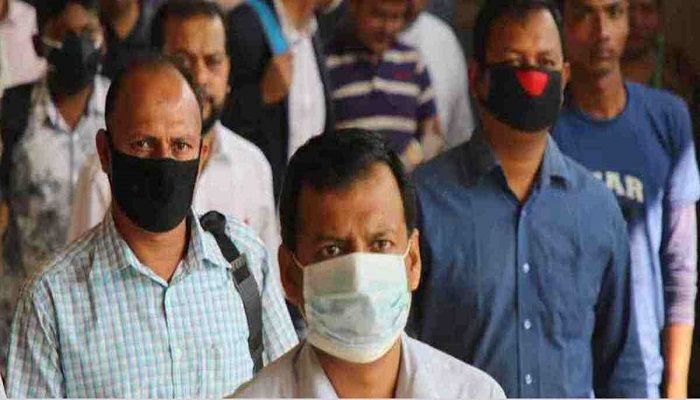
Desk Report
Publish: 10 Jun 2020, 02:32 pm

Brac in the latest survey said that the lockdown and social distancing measures announced to contain the spread of the COVID-19 pandemic have forced 95% of people across the country to suffer a loss in their income.
The disclosure was made on Tuesday while revealing the research findings through a video conference.
A total of 2,317 respondents (68% from rural areas and 32% from urban) from different socio-economic backgrounds in 64 districts joined the survey conducted from 9 to 13 May 2020.
Approximately 51% of the respondents said their household income was reduced to zero after the public holiday was declared in late March. Around 62% of low-income wage earners lost reduced work opportunities.
The pandemic left around 28% of the respondents economically inactive. The average monthly household income of the respondents was TK 24,565 before the public holidays, but that declined to BDT 7,096 in May, registering a 76% decline in household income. Loss in income was somewhat greater in urban areas (79%) than in the rural ones (75%), it added.
Brac conducted the survey to get an insight into the overall sense of public awareness about the COVID-19 pandemic and its economic impact in Bangladesh.
Of the total respondents, 37.5% were men and 63.5% women.
The survey analysis shows daily wage earners have slowly started to regain their livelihood. However, many of these people and their families will still need support for at least three more months to recover from the setback posed by the pandemic.
Abul Kalam Azad, Former Principal Coordinator (SDG Affairs) of Prime Minister’s Office; Sudipto Mukherjee, Resident Representative of UNDP in Bangladesh; Mizanur Rahman Khan, Joint Editor of Prothom Alo; Shameran Abed, Senior Director of BRAC; and Nobonita Chowdhury, Director of BRAC, joined the event as panelists. KAM Morshed, Senior Director, BRAC, moderated the press conference organized to release the findings of the perception survey titled ‘COVID-19 awareness and economic impact.’
Speaking at the briefing, former Principal Coordinator of SDG Affairs at the Prime Minister’s Office Abul Kalam Azad lauded the BRAC initiative and said all microfinance institutions (MFIs) and NGOs need to follow BRAC footsteps in returning savings to low-income people.
“The government is trying to finance the labor-intensive sectors so that it can help create more jobs. Skills development training for migrant workers can also help them get back their jobs in the current crisis,” said Azad.
Brac Senior Director Shameran Abed accredited the role of MFIs in reaching cash assistance to vulnerable people and enterprises.
“Getting money to people through banks is challenging since banks lack capacity. A new mechanism is needed and the mobile banking system is already delivering. Once identified, people are getting easy access to finance through the system,” Shameran Abed said.
Brac, with the help of donors and partners, has delivered emergency cash support to 360,000 families. Under the Microfinance program, savings were returned to 500,000 members, to support in their economic recovery process.
Sudipto Mukherjee, Resident UNDP Representative, stressed on concerted efforts to avert the crisis posed by the pandemic.
“We cannot afford to leave anyone behind. That is more important than being concerned about duplication. Universal protection is required for a welfare state like Bangladesh,” Mukherjee said.
At the same time, the next plan of action should focus on getting the economy back on its feet, maintaining proper health precautions.
Suggestions to tackle the crisis included the strict introduction of a ‘pro-poor’ lens to review and implement the recovery and rehabilitation plans as well as the already declared stimulus packages or incentives.
Transparency was stressed for delivery mechanisms of assistance and stimulus packages for different private sectors. Authorities were urged to engage NGOs and community-based organizations to monitor the listing of beneficiaries and cash transfer through mobile banking was stressed for distribution.
Preparing a database of beneficiaries to avoid duplication and introducing a prompt complaint redressal mechanism was also recommended.
Survey findings in details
While conducting the research, respondents from Pirojpur (96%), Cox’s Bazar (95%), Rangamati (95%), Gaibandha (94%) and Brahmanbaria (93%) were found to have suffered greater losses in income.
In the survey, women-headed households were found to be more economically vulnerable compared to households headed by men. The average income of women-headed households declined more (80%) than men-headed households (75%). Women-headed households (57%) reportedly had their monthly income reduced to zero during the public holiday, which was 49% for households headed by men.
The loss in income inevitably impacted food security, particularly of low-income people. On average, 16% of overall households reported that they had food only to survive for 1-3 days, while 3% of the households did not have any food during the survey time.
The survey found 11% of respondents think that there was an increase in violence against women during the holidays. The majority (58%) of them think that violence increased as poverty was intensified by the pandemic.
More than three-fourths (76%) of respondents now practice coronavirus preventive behaviors, while the remaining one-fourth practices the behaviors irregularly, which is alarming. More than three-fourth (78%) respondents feel that there is no chance or very little chance for them of getting infected with the coronavirus. Respondents from rural areas (81%) compared to urban areas (71%) express more confidence in not getting infected. Such beliefs might spread reluctance among people in maintaining the precautions against the spread of coronavirus.
About 38% of the respondents believe more coordinated efforts are needed to reach assistance to the people in need. The survey also found that the need for assistance is higher in rural areas (72%) compared to urban areas (62%).
Source: UNB
Subscribe Shampratik Deshkal Youtube Channel
© 2024 Shampratik Deshkal All Rights Reserved. Design & Developed By Root Soft Bangladesh